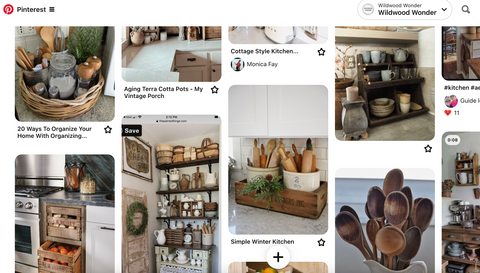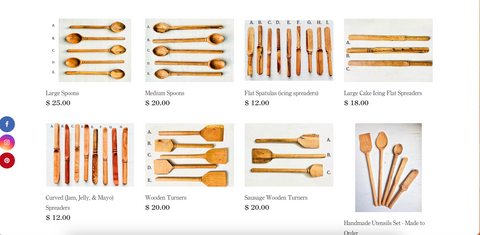Make Your Wooden Spoons Last!
Make Your Wooden Spoons Last!
A Must for Every Cottage Kitchen!
Wooden spoons should be at the top of your list of cottage kitchen essentials! They embody Cottagecore's aesthetic for a reason besides their power to create warmth in the kitchen with their shapes, textures, and earthy tones. Wooden spoons allow a natural connection to nature as we make food from scratch, creating nourishing foods from whole ingredients.
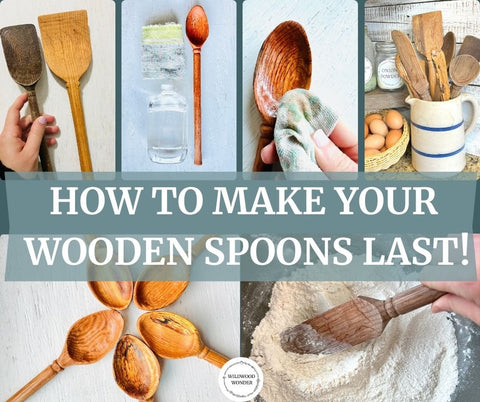
The cottage kitchens of the 17th century brought vegetables, fruits, and eggs from their cottage gardens in woven baskets made from natural materials and fibers. They lived a sustainable lifestyle where every resource was valuable. The humble spoon represents the mindset of the working class and their resourcefulness.
As trees fell in the community, wood was dived into firewood and lumber, and certain pieces were saved to create wooden vessels/utensils. The people found ways to use that resource by providing firewood for warmth and cooking meals with a wooden spoon made from the same tree. In a way, the modern spoon makers of today, like my father, have carried on this same tradition.
Wooden Spoons in a Modern Age:
Before his retirement, my father worked with the disaster relief unit for many years. As storms came through, a group would go into neighborhoods and towns, helping people remove trees from their yards, homes, and roadways. He ended up with scrap pieces of wood from various jobs, saving them for the days he could do some woodturning when he finally retired.
He now uses the wood from family, neighbors, and friends' properties when trees have fallen or are being cut down. What started as gifts to the family have now become a part of the Wildwood Wonder shop! All of the photos in this post feature his work. All wood-turned pieces are posted as they are made. You can check out what is now available HERE.
Wooden Spoons Have Lasted Through the Ages:
Wooden utensils have been a staple in the kitchen as far back as the Neolithic period. Examples of wooden vessels, including an oak spoon, dating back to Neolithic times, were found in the bog Christiansholms Mose near Copenhagen, Denmark. (Read more here) Wooden spoons were discovered in the tomb of Tjetji, in the Teti Pyramid Cemetery in Egypt, which dates back to the New Kingdom. (Read more here) The wooden spoon resided within the kitchens throughout the centuries, as table spoons soon became made of metal. But as we all know, the wooden kitchen spoon has withstood the test of time!
Why is Wood a Good Choice?
- Wooden spoons are durable. They won't melt like plastic utensils. Most handmade spoons are made of durable wood such as red or white oak.
- They are also gentler on some pots and pans than metal and plastic utensils.
- They are versatile and can be used for multiple functions in the kitchen.
- Wooden utensils don't hold heat, so you won't have to worry about burning your hand. This makes them perfect to use while children learn to cook!
- You don't have to worry about your utensils chemically reacting with acidic foods like metal and plastic utensils.
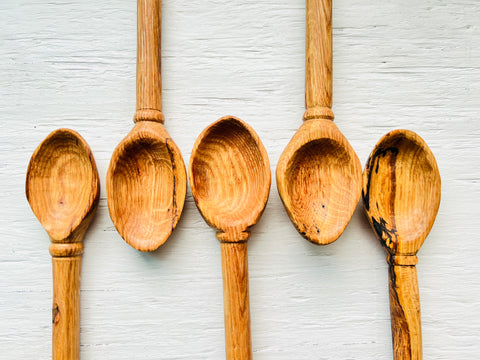
How to Take Care of Your Wooden Spoons:
Wooden spoons and utensils require special care, and you must set aside time each month to protect them during everyday use. We will discuss what not to do and what to do to keep your spoons maintained enough to last years.
- Avoid Soaking in Water: The most important thing to avoid is letting your spoons soak in water. Never place them in the dishwasher, either. If your children have washing dishes as a chore, you should make sure you handle cleaning the wooden utensils. I know this from experience.
- Cleaning Your Spoons: Wash your spoons as soon as you are done, using warm water, dish soap, and a scrubber. You can also use baking soda and lemon to clean wooden surfaces like cutting boards and utensils. Wash your wooden items with warm water and let them air dry.
-
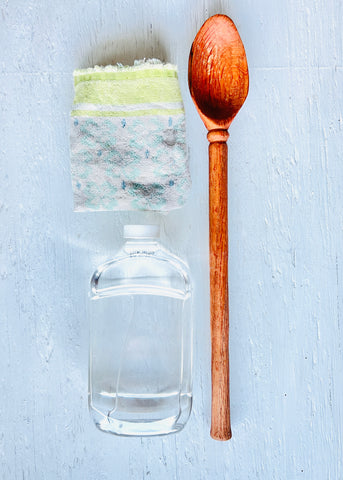
- Oil Your Spoons Monthly: We prefer Mineral oil because it's easy to obtain, inexpensive (save money for good spoons), odorless, and tasteless. I have a ziplock bag designed to keep my oil and a soft cloth that I reuse for each oiling. Take a soft cloth and generously pour two tablespoons of mineral oil on your cloth. Rub the oil on one end of the spoon, reapply the oil to your cloth, and continue oiling until the whole spoon is covered. Lay your oiled spoon down and let it sit for over 24 hours before using it.
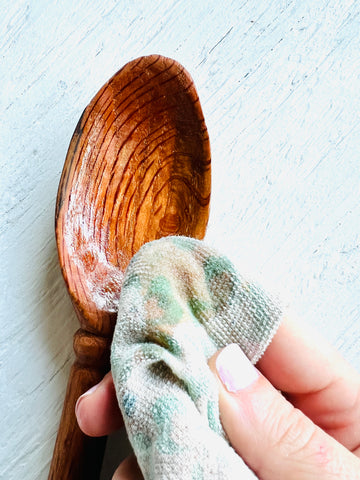
Because I often use my favorite wooden utensils, they have rough edges. If you are in the same situation, take 220 sandpaper to smooth out those edges, clean your pieces off, let them dry, and oil them up!
Do you need to replace your spoons?
Unfortunately, there will be times when we need to retire our wooden utensils. Sadness, I know. Sometimes, it will be obvious, such as long splits in the wood. These splits can gather bacteria and will continue to split through time.
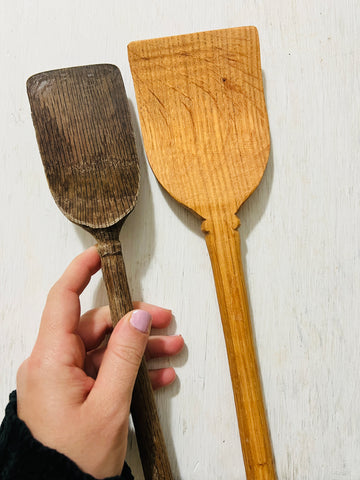
If your spoon is oddly discolored, like the example above, the turner on the left is darker than the turner on the right, it may be due to the natural dyes in the foods you cook. Does your spoon have an odd smell, even after washing it well? You may want to replace it. A good rule of thumb is to replace wood utensils every five years. Do you throw them away? No!
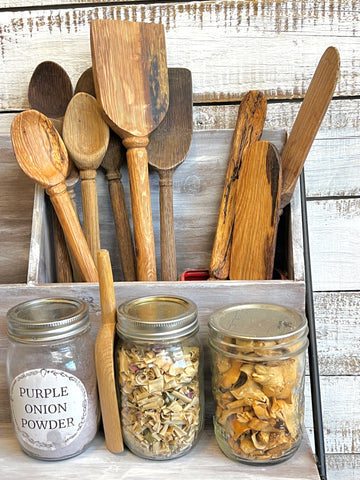
How to Reuse/Up-cycle Your Wooden Spoons
If your spoons are not made of Walnut wood, you can compost them. The best type of wood composting would be the hotbed technique. But unless it's your only choice, I suggest being creative with your non-functional wooden utensils.
Use your spoons as a home decor piece. Place them inside an heirloom crock and use it as a centerpiece. Or an addition to help style a shelf.

If you can drill a hole in the handle of your spoons and then string them on some thin rope, you can hang them up, creating a unique piece of decor. Want to avoid grouping them? If you have a large enough collection, you could make a statement wall piece by hanging them individually.
Check out my Pinterest Board, Cottage Kitchen Ideas, for a ton of wooden spoon setups! Follow Wildwood Wonder HERE
